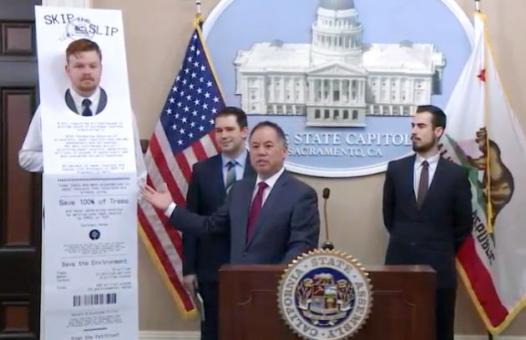A California lawmaker introduced legislation this week that would make the state the first to bar retailers from giving out printed receipts unless a customer requests them.
The proposed measure — Assembly Bill 161 — would require stores to use electronic receipts as the default option. Stores that give out printed receipts without first being asked by the customer could be subject to fines. If passed, the bill could have implications far beyond California, according to experts.
"There's a negative impact on the environment with these receipts and the inability to recycle them," said Assemblyman Phil Ting, D-San Francisco, who introduced the legislation.
Speaking at a press conference on Tuesday in Sacramento, the lawmaker said there are health concerns for consumers and store employees with some of the chemicals used in paper receipts. He acknowledged that some retailers — both large and small — have already started offering consumers the option to receive a digital receipt as an alternative.
California has been seen as an environmental trendsetter, and given its large market size a switch to e-receipts could encourage more retailers to curb the use of printed receipts. Last year, the state legislature passed a bill curbing the use of single-use plastic straws in California, and it's already led to efforts in Oregon and elsewhere to adopt similar laws.
Up to 10 million trees and 21 billion gallons of water are used annually in the U.S. to create receipts, according to Green America, a green ecology organization. It said receipts annually generate 686 million pounds of waste and 12 billion pounds of carbon dioxide, or the equivalent of 1 million cars on the road.
"To the degree certain retailers implement it in California, then they have the system set up to kind of operate that way with consumers and there's an easier transition to moving it to other markets," said Heather Honea, chair of the marketing department at San Diego State University.
Then again, the use of electronic receipts raises some privacy concerns since retailers usually require an email address for an electronic receipt and companies will then be able to potentially track and collect more data about customers.
"There are huge privacy concerns," said Honea. "Privacy legislation in this country, and even in California, is pretty minimal relative to the amount of data that is consistently collected on consumers."
Honea said any moment that retailers or businesses transact with consumers "they can identify who you are and they are sending information. Certainly, this is just one more opportunity for more of that information. But that doesn't always create bad outcomes for consumers because sometimes the more information a retailer has about you, the more they can optimize the experience or the way they target you [with discounts]."
That said, some retailers already collect information about consumers through "club" or membership programs that target them with promotions, including store coupons.
Pamela Williams, a spokesperson for the California Retailers Association, said in a statement that it was "too soon for us to comment, since the bill was just introduced [Monday]. Many of the larger stores are already offering the option of e-receipts or hard copy to their customers, but we will need to determine the workability of a mandate for e-receipts for small and medium-size stores."
If AB 161 passes, it would make e-receipts the default for retailers statewide as of Jan. 1, 2022. Language in the new "Skip the Slip" bill includes fines of up to $300 per year for stores violating the mandate for digital receipts.
Proponents of the bill say the legislation would help reduce waste as well as contaminants in the recycling stream from toxins often used to coat the paper-based receipts.
According to Ting, many of the paper receipts used by retailers today contain BPA, or bisphenol A — a chemical he called "harmful" both to the environment and human health. Thermal receipt paper frequently contains BPA or a chemical cousin that has raised similar concerns, bisphenol S, or BPS.
"There's been a lot of research in the last 20 years about the harmful effects of bisphenol A," said Caroline Cox of the Center for Environmental Health, an organization that seeks to reduce exposure to toxic chemicals. "It causes a whole variety of health problems, many of them related to a woman's ability to have a successful pregnancy."
Cox has been involved in research over the years that includes testing of receipts for toxic chemicals. One study released in 2016involved the testing of hundreds of receipts nationwide and found toxic chemicals in receipts of many large chain stores.
Cox said most thermal receipt paper has switched from BPA to BPS in recent years. Still, she said with more research being done on BPS, "we find that it has many of the same effects as BPA."
Reporter





